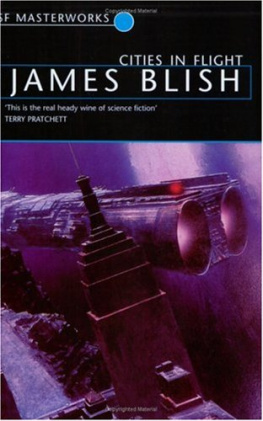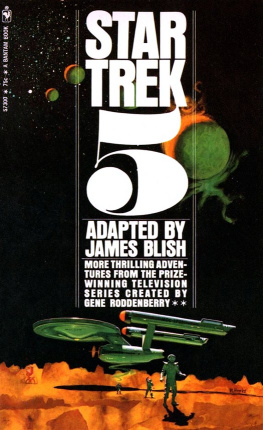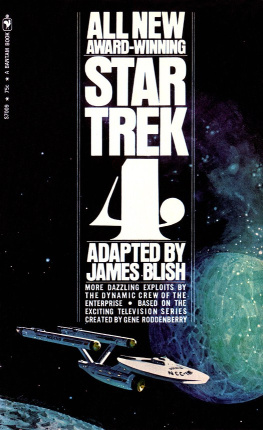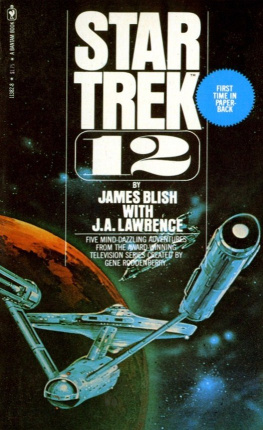James Blish - Cities in Flight
Here you can read online James Blish - Cities in Flight full text of the book (entire story) in english for free. Download pdf and epub, get meaning, cover and reviews about this ebook. genre: Science fiction. Description of the work, (preface) as well as reviews are available. Best literature library LitArk.com created for fans of good reading and offers a wide selection of genres:
Romance novel
Science fiction
Adventure
Detective
Science
History
Home and family
Prose
Art
Politics
Computer
Non-fiction
Religion
Business
Children
Humor
Choose a favorite category and find really read worthwhile books. Enjoy immersion in the world of imagination, feel the emotions of the characters or learn something new for yourself, make an fascinating discovery.
- Book:Cities in Flight
- Author:
- Genre:
- Rating:4 / 5
- Favourites:Add to favourites
- Your mark:
- 80
- 1
- 2
- 3
- 4
- 5
Cities in Flight: summary, description and annotation
We offer to read an annotation, description, summary or preface (depends on what the author of the book "Cities in Flight" wrote himself). If you haven't found the necessary information about the book — write in the comments, we will try to find it.
Cities in Flight — read online for free the complete book (whole text) full work
Below is the text of the book, divided by pages. System saving the place of the last page read, allows you to conveniently read the book "Cities in Flight" online for free, without having to search again every time where you left off. Put a bookmark, and you can go to the page where you finished reading at any time.
Font size:
Interval:
Bookmark:
James Blish
Cities in Flight
INTRODUCTION
Betty Ballantine
SOME STORIES are written to provide entertainment: some to teach: some as a form of self expression: some because the writer could not do otherwise: and some combine all these formsand morethereby creating in the reader another level of interest altogether: the need to know more about the author. James Blish was such a writer.
When I first met Jim he was well known to the burgeoning field of science fiction. He was extremely active in the science fiction world, in teaching, in sponsoring workshops, in research of specialized works, and in several areas beyond the actual writing of science fiction. He had already published many outstanding short stories and at least one of the novels that would eventually become the tetralogy titled Cities in Flight.
In the early 1950s I had started editing science fiction for Ballantine Books and used the science fiction magazine media as a fertile source for authors who might be interested in doing novels for our list. It was a bonanza. Every author in the field wanted to see his work in book form. Arthur Clarke, Fred Pohl, Ted Sturgeon, Henry Kuttner, Lester Del Rey, Cyril Kornbloth, and James Blish were just a few of the notables who flowed into Ballantines original science fiction listall nurtured, so to speak, in the bosom of John Campbell and his ilk. Yet at that time, science fiction was still a closed world. Fans and professionals blended in a way unique to the genre. Of necessity, we talked to each other, attended our own conventions, admired one another, were confidently aware that it required a certain degree of intelligence to enjoy science fiction, and meanwhile appreciated the quality of our exclusivity while waiting for the rest of the literary world to catch up.
Jim was a graduate of pulp fiction, as were most of his contemporary writers. He believed profoundly in the power of intellect and, indeed, was in danger of being positively erudite. Fortunately the sense of drive and adventure that characterized the pulps never left him and are very evident in Cities in Flight. It is equally clear that part of his mission was to teach, an objective he shared with Heinlein. But what is truly astonishing is that his hardcore physics and engineering ideas were so meticulously researched that the spindizzy drive which carried mankind to the stars seems convincingly possiblethe very essence of hardcore science fiction. Yet Jim, the really deep thinker, could never be satisfied with the surface adventure or even the hardware that made the adventure possible. He thought through the conflicting philosophic concepts that were necessarily provoked by the giant leap, and he used that conflict in the persons of his chief characters to maintain tension, to keep his readers turning the pages as rapidly as possible. In other words, it is the human element, the emotional confrontations, that keep the stories moving.
One would never have suspected, on meeting this quiet man, the vaulting imagination or the intellectual daring that lurked beneath the gentle exterior, much less his urgent need to express his deep concern for humanity. Yet this is all there, embodied in the four novels of Cities in Flight. And, of course, in his many other writings, notably in the Hugo Award-winning A Case of Conscience, in which he tackled the inconsistencies of religion, the first time a science fiction writer had done so.
Science fiction was the perfect medium for a mind like Jimsa writing form that permitted, indeed, demanded, no limit to anything that man could imagine. He was the very apotheosis of a science fiction writer for he insisted on justifying whatever extravagant notion he imagined, in whatever field, on whatever subject. Whether it was the lifting of entire cities, the complexities involved in anti-gravity, the self-destructive paradox of matter versus anti-matter, the mind-boggling problems raised by virtual immortality, or the end of time itself, no aspect of the human condition was too daring, no concept too vast for logic to rationalizeprovided one had the courage to use it. Again and again one is astounded by the magnitude of his thinking. What is so remarkable about Jim Blish is that he really believed, and thought, in logical terms. He would happily have argued that he actually had very little imagination, his most outrageous confrontations being merely the result of logical thinking. He thus completed the circle, making it absolutely necessary for him to think through the wildest leaps of his very fertile mind. Later on, when Spock appeared on the scene, it seemed to me that he and Jim had much in common. Perhaps thats why Jim enjoyed novelizing so many Star Trek scripts and of course produced his own contributions to that world.
James Blish was quiet, and complex, and a man of high moral principle. But most of all he enjoyed using that powerful mind. So whatever the challenge he created for himself, whatever the impossible condition to which he had given birth, he had the intellect, and the daring, and, indeed, the need to meet it head-on and come as close as any man could to making the impossible highly probable. I hope the results were satisfying for Jim. (I doubt ithe was rarely satisfied with his own work. For Jim, there was always something beyond.)
But one thing is sure: His oeuvre is a permanent feast for his readers, of whom there are now something like three generations extant.
And if you, gentle reader, are encountering Cities in Flight for the first time, I envy you.
Bearsville, 1999Cities in Flight
To Frederik Pohl
To L. Sprague DeCamp
To John W. Campbell, Jr.
THEY SHALL HAVE STARS
And death shall have no dominion
Dead men naked they shall be one
With the man in the wind and the west moon;
When their bones are picked clean and the clean bones gone,
They shall have stars at elbow and foot
DYLAN THOMASWhile Vegan civilization was undergoing this peculiar decline in influence, while at the height of its political and military power, the culture which was eventually to replace it was beginning to unfold. The reader should bear in mind that at that time nobody had ever heard of the Earth, and the planets sun, Sol, was known only as an undistinguished type Go star in the Draco sector. It is possiblealthough highly unlikelythat Vega knew that the Earth had developed space flight some time before the events we have just reviewed here. It was, however, only local interplanetary flight; up to this period, Earth had taken no part in Galactic history. It was inevitable, however, that Earth should make the two crucial discoveries which would bring it on to that starry stage. We may be very sure that Vega, had she known that Earth was to be her successor, would have exerted all of her enormous might to prevent it. That Vega failed to do so is evidence enough that she had no real idea of what was happening on Earth at this time .
ACREFF-MONALES: The Milky Way: Five Cultural PortraitsBOOK ONE
PRELUDE:
WASHINGTON
We do not believe any group of men adequate enough or wise enough to operate without scrutiny or without criticism. We know that the only way to avoid error is to detect it, that the only way to detect it is to be free to inquire. We know that in secrecy error undetected will flourish and subvert.
J. ROBERT OPPENHEIMERTHE SHADOWS flickered on the walls to his left and right, just inside the edges of his vision, like shapes stepping quickly back into invisible doorways. Despite his bone-deep weariness, they made him nervous, almost made him wish that Dr. Corsi would put out the fire. Nevertheless, he remained staring into the leaping orange light, feeling the heat tightening his cheeks and the skin around his eyes, and soaking into his chest
Font size:
Interval:
Bookmark:
Similar books «Cities in Flight»
Look at similar books to Cities in Flight. We have selected literature similar in name and meaning in the hope of providing readers with more options to find new, interesting, not yet read works.
Discussion, reviews of the book Cities in Flight and just readers' own opinions. Leave your comments, write what you think about the work, its meaning or the main characters. Specify what exactly you liked and what you didn't like, and why you think so.














